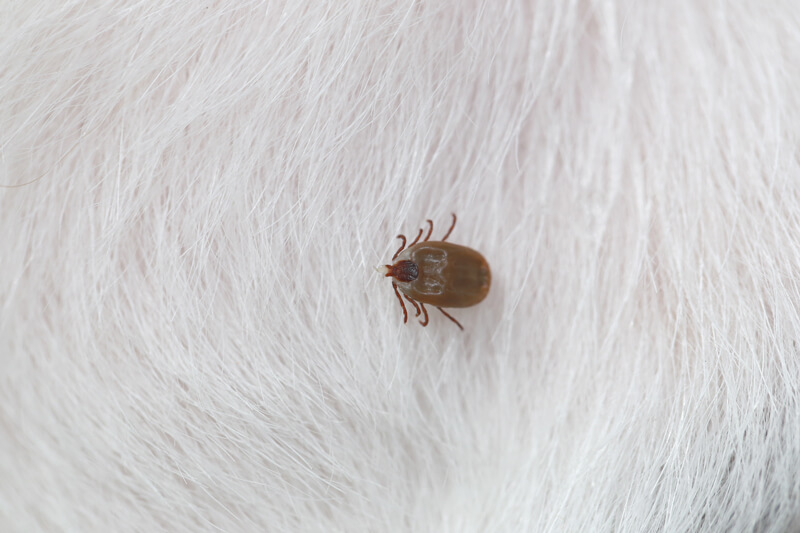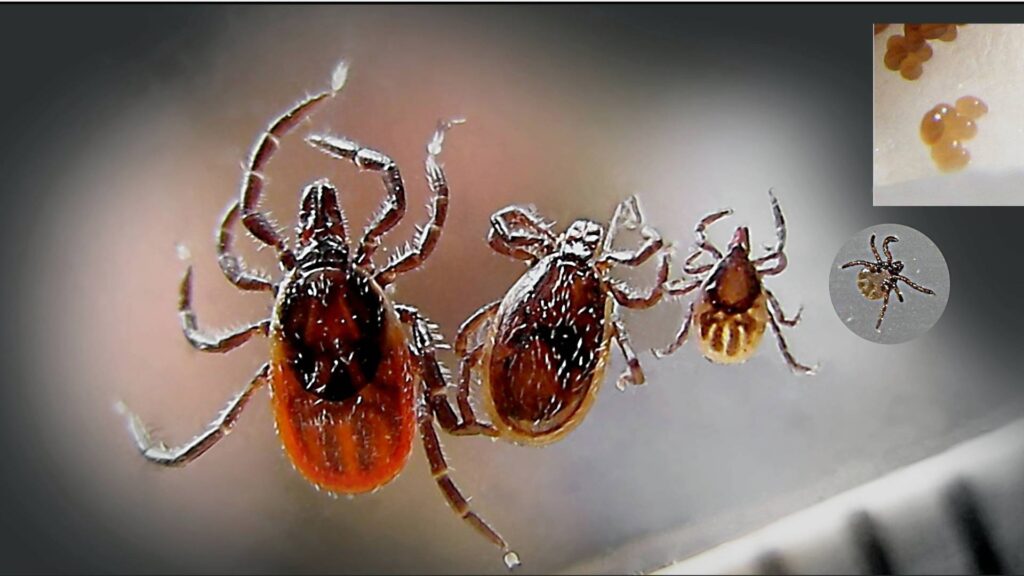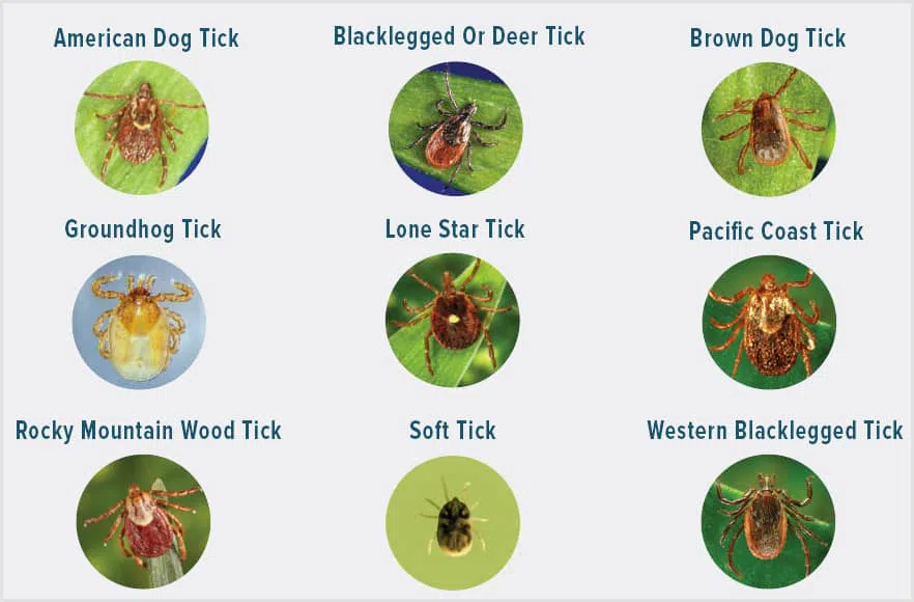Tick Removal Services in Denton
Serving homes, parks, and commercial properties in Lewisville and Krum
Tick Control in Denton, Texas, Pest Control Xperts
Enjoying the outdoors is a big part of living in Denton, but venturing into the backyard or hiking near the Greenbelt often comes with a hidden risk: ticks. These parasites are more than just a nuisance; they are aggressive blood feeders that latch onto pets and people, potentially transmitting serious illnesses. At Pest Control Xperts, we provide specialized tick removal and outdoor pest control services for residents in Denton, Lewisville, and Krum. Whether you live on a wooded lot near Lake Lewisville or have a backyard backing up to a pasture in Krum, ticks can migrate onto your property and put your household at safety risk.
Ticks are patient hunters. They do not jump or fly; they wait on the tips of tall grasses and shrubs for a host to brush past. This behavior, known as “questing,” makes your yard’s perimeter a prime danger zone. Our team prioritizes a detailed pest inspection to identify the habitat zones supporting the population. We utilize safe pest management practices to create a protective barrier around your home, reducing the risk of bites for your family and pets. With clear communication and dependable scheduling, we help you reclaim your yard. When you need effective defense against ticks, we are ready to assist.
Tick Problems We Solve in Denton
In North Texas, we deal with several resilient tick species, including the American Dog Tick, the Brown Dog Tick, and the Lone Star Tick. Each presents unique challenges. While some infest dogs primarily, others are aggressive toward humans. The real danger lies in their small size; a nymph tick can be as small as a poppy seed, making it incredibly difficult to spot until it has already attached. Homeowners often struggle because they treat the lawn but neglect the tall brush or wooded edges where ticks actually live.
Our goal is comprehensive infestation control. We focus on vegetation management and targeted applications that hit ticks where they hide. Effective pest management requires addressing the wildlife that brings ticks into your yard, such as deer, raccoons, and rodents. We help you create a safer environment so you can enjoy your outdoor space without constantly checking for parasites.
Common signs of a tick issue:
- Finding ticks attached to pets after they come in from the yard
- Spotting small, slow-moving bugs on walls or curtains (common with Brown Dog Ticks)
- Red, bullseye-patterned rashes on skin (seek medical attention immediately)
- Ticks crawling on clothing after gardening or yard work
- Pets scratching at their ears or neck incessantly
- Small bumps on your pet’s skin buried under the fur
- Seeing opossums or raccoons frequently crossing your property

Types of Tick Issues We Handle
Yard and perimeter tick reduction
The majority of tick encounters happen in the transition zone—the area where your manicured lawn meets the woods, fence line, or tall grass. Ticks require high humidity to survive, so they stay out of the direct sun in the middle of the lawn. They gather in leaf litter, ground cover, and low hanging branches. Treating these specific areas is key to reducing the population.
What we look for during inspection:
- Overgrown vegetation along fences and property lines
- Piles of leaf litter or brush that hold moisture
- Shaded areas under decks and playsets
- Tall ornamental grasses or dense ground cover
How we approach treatment:
We perform targeted extermination services using residual products applied to the harborage zones. We treat the perimeter of the yard, the base of trees, and under shrubs. This creates a pest barrier installation that kills ticks as they wait for a host. We avoid broad spraying of open grass where ticks rarely go, focusing instead on the danger zones.
Brown Dog Tick indoor infestations
Unlike other species, the Brown Dog Tick is unique because it can complete its entire life cycle indoors. It thrives in kennels and homes, often hiding behind baseboards, in window casings, and even in curtains. An indoor tick infestation is a nightmare for pet owners, as these ticks can reproduce rapidly inside the home, crawling up walls and furniture.
What we look for during inspection:
- Ticks crawling on walls or ceilings
- Activity around dog beds and sleeping areas
- Cracks and crevices near the floor where eggs are laid
- Ticks hidden in the folds of upholstered furniture
How we approach treatment:
We utilize integrated pest management to handle indoor infestations. This involves treating cracks and crevices where ticks hide and using insect growth regulators to stop eggs from developing. We work closely with you to ensure pets are treated by a veterinarian simultaneously, as the animal acts as the primary host. Indoor tick control requires a coordinated effort to break the cycle.
Wildlife management for tick prevention
Ticks do not travel far on their own; they are carried into your yard by wildlife. Deer, rodents, and small mammals are the “bus” that drops ticks off at your doorstep. If you have a bird feeder attracting squirrels or an open crawlspace harboring raccoons, you likely have a higher tick pressure. Addressing the wildlife traffic is an essential part of long-term tick control.
What we look for during inspection:
- Deer trails or bedding areas near the property
- Bird feeders and wildlife food sources
- Rodent burrows or activity around sheds
- Gaps in fences that allow wildlife entry
How we approach treatment:
We provide guidance on pest deterrent strategies to make your yard less attractive to wildlife. This includes recommendations for exclusion techniques for pests, such as fencing repair or removing food attractants. By reducing the number of wild animals crossing your property, we naturally reduce the number of new ticks being introduced.

Our Tick Inspection and Treatment Approach
At Pest Control Xperts, effective tick control begins with a site assessment. Our pest inspection focuses on identifying the specific “micro-climates” in your yard where ticks survive. We check the edge of the woods, the garden beds, and the areas where your pets spend the most time. We also identify the species of tick, as this dictates our strategy—managing Lone Star Ticks in the yard is different from battling Brown Dog Ticks inside the house.
Based on our findings, we develop a customized plan. For outdoor issues, we apply granular or liquid treatments to the vegetation and soil in target areas. We use professional pest control products designed to hold up against the elements while effectively reducing tick numbers. For indoor issues, we focus on safe application in living areas to target nesting sites.
We are committed to safe pest management. We educate our clients on the importance of re-entry intervals, ensuring that people and pets stay off treated surfaces until they are dry. Our pest assessment services include follow-up recommendations for landscaping changes, such as creating a gravel buffer zone, which creates a physical barrier that ticks are reluctant to cross. By combining chemical control with cultural changes, we provide comprehensive pest solutions.

Tick Prevention and Pest Proofing Tips for Denton Residents
Preventing ticks requires managing your environment. In Denton’s active spring and fall seasons, ticks are at their peak. While professional treatment knocks down the population, simple landscaping adjustments can make your property hostile to them. Property pest management is about reducing moisture and shelter.
Preventative steps that actually help:
- Keep grass mowed short and remove tall weeds
- Create a 3-foot wide barrier of wood chips or gravel between lawns and wooded areas
- Remove leaf litter and clear brush from around the home
- Stack wood neatly and in a dry area to discourage rodents
- Keep playground equipment, decks, and patios away from yard edges
- Remove old furniture or trash from the yard that gives ticks a place to hide
- Consult your vet about preventative tick treatments for dogs and cats
- Discourage deer activity by planting deer-resistant vegetation
- Seal cracks and crevices indoors to prevent Brown Dog Ticks from nesting
Incorporating these pest deterrent strategies significantly lowers the risk of contact. Implementing pest proofing measures, like fixing fences to keep out deer, cuts off the supply chain of new ticks. For seasonal pest control, we recommend starting tick treatments in early spring before the adults become active.
Residential and Commercial Tick Control
Ticks are a concern for any property where people or pets spend time outdoors. We provide residential pest control services to protect families in Denton, Lewisville, and Krum. We want you to feel safe playing catch in the yard or letting the dog out without fear of parasites. We treat yards of all sizes, from small suburban lots to larger rural acreages.
For businesses, tick control is vital for liability and customer safety. We offer commercial pest services for doggy daycares, outdoor event venues, and parks. Managing ticks in these high-traffic areas requires diligence and regular service. We provide documentation and safety protocols to ensure your business remains compliant. Whether you run a veterinary clinic or manage a hiking trail system, our pest exterminators have the expertise to reduce tick populations effectively.
Professional Tick Extermination vs DIY Methods
Many homeowners try to control ticks with over-the-counter yard sprays attached to a garden hose. While this puts out a lot of product, it often lacks the residual power needed to kill ticks over time. Ticks are tough; they have a hard exoskeleton that protects them. Store-bought sprays are often too diluted to be effective against a heavy infestation. Furthermore, homeowners often spray the wrong areas, treating the sunny lawn instead of the shaded perimeter.
Professional tick extermination uses specialized equipment to deliver the material into the dense brush and leaf litter where ticks hide. We use high-pressure misters or granular spreaders to ensure deep penetration. We also have access to products that include Insect Growth Regulators (IGRs), which stop immature ticks from molting into adults.
Safety is also a key factor. Handling concentrated chemicals without training can be risky. We prioritize the safe use of products around kids and pets. We know exactly how much to apply and where, avoiding runoff and unnecessary exposure. By hiring a professional, you get a targeted, effective solution that protects your family without the guesswork.
Frequently Asked Questions About Tick Control
Do you provide tick control in Denton and nearby areas?
Yes, we provide specialized tick control services in Denton, Lewisville, Krum, and the surrounding communities. We understand the local terrain and wildlife patterns that contribute to tick activity. We serve both residential and commercial properties.
When is tick season in Denton?
Ticks are most active in the spring and fall, but in our mild Texas climate, they can survive year-round. We recommend starting treatments in early spring (March/April) and continuing through the fall to maintain control.
Do I need to treat my pets if you treat the yard?
Yes. Treating the yard reduces the population significantly, but your pet is a mobile tick magnet. You should always use a veterinary-approved tick preventative on your animals to ensure they are fully protected when they leave your property.
How long does it take for the treatment to work?
Liquid treatments begin working immediately upon drying. You should see a reduction in tick activity within 24 to 48 hours. Granular treatments may take a few days to activate but provide longer-lasting protection.
Does the treatment kill all ticks?
No outdoor treatment can promise 100% elimination because wildlife can bring new ticks into the yard at any time. However, our services drastically reduce the population and create a barrier that kills new ticks quickly, lowering the risk of bites.
Is the treatment safe for my kids?
We use safe pest management protocols. We ask that children and pets stay inside during the application and until the product has completely dried. Once dry, the yard is safe for normal use.
Can ticks live inside my house?
Most ticks cannot survive long indoors due to the dry air. However, the Brown Dog Tick is an exception. It can live and breed inside your home. If you are finding ticks on walls or curtains, call us immediately, as this requires a specific indoor treatment plan.
Is there a local tick removal service near me?
If you are in Denton, Lewisville, or Krum, Pest Control Xperts is your local provider. We are nearby and ready to help. Our team knows the specific tick hotspots in our area, from the Greenbelt to rural fence lines.
Service Area for Tick Control in and Around Denton, Texas
Pest Control Xperts is proud to serve Denton County. From the wooded lots in Shady Shores to the open properties in Ponder, we cover the entire region. We understand how the mix of urban and rural environments in our area creates the perfect storm for tick activity. Providing local service means we are committed to helping our neighbors enjoy the outdoors safely.
- Denton
- Lewisville
- Krum
- Corinth
- Shady Shores
- Lake Dallas
- Argyle
- Sanger
- Ponder
We are dedicated to providing reliable and effective pest management. If you live in or near these communities, reach out to us for assistance.
Zip codes we serve: 76201, 76205, 76207, 76208, 76209, 76210, 75057, 76249
Conclusion
At Pest Control Xperts, we know that ticks are a serious concern for anyone who loves the outdoors. Whether you are worried about your children playing in the yard or your pets picking up parasites, our team has the expertise to solve the problem. We help homeowners in Denton, Lewisville, and Krum lower the risk with proven, effective control strategies.
Don’t let ticks keep you inside. If you are seeing these pests on your property, it is time to take action. Contact us today to schedule your inspection and let us help you take back your backyard.
